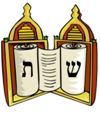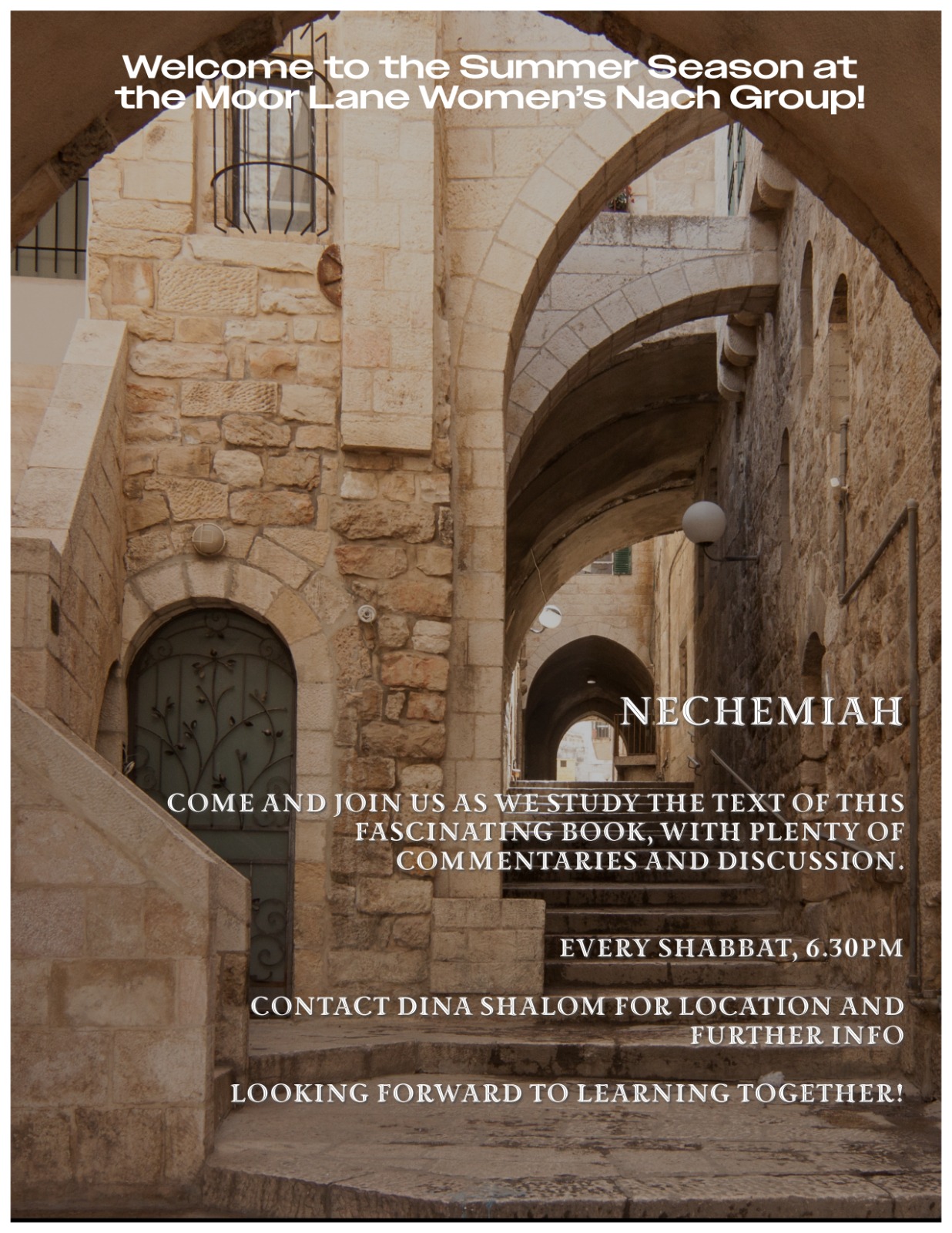
ק׳ ק׳ שׁערי תפילה

**********

*****

מן השמים תנחמו
אריכות ימים
Moorlanenews
would like to use this opportunity
to send their heartfelt condolences to
Vidal נ״י
and all his family
and wish them
מן השמים תנחמו
אריכות ימים
******
The annual Parklife music festival returns to
Heaton Park THIS coming weekend
(Friday, Shabbat & Sunday).
As usual, Parklife attracts around 80,000 attendees per day,
who come from all over the country.
Obviously, this many visitors to the area raises the potential for incidents to occur
and this is one of the reasons the organisers arrange for so many security personnel
in the area over the two/ three days of the festival.
Therefore, we kindly ask the kahal to be vigilant and ensure the usual security steps are taken
whilst tefillot, avot ubanim or learning sessions are taking place
i.e. ensure all doors to the building are properly closed.
Please remember to report any antisemitic incidents,
or incidents of suspicious behaviour immediately,
to the police on 999 and to CST on 0800 032 3263.
******

לוח זמני תפלה לקיץ תשפ״ה
Summer Timetable 5785 – 2025
מוצאי שבת | ערבית )מוצ”ש( | שקיעה | סוף זמן קראת שמע | זמן שבת | פלג מנחה (תה״ד) | פלג מנחה (לבוש) | מנחה וקבלת שבת | תאריך | שבת פרשת |
Shabbat Ends | Arbit | Sunset | Shema to be read before | Candles to be |
| Earliest Candle lighting | Minha & Kabbalat Shabbat* | Date | Parasha |
PM | PM | PM | AM | PM | PM | PM | PM |
|
|
10:57 | 10:53 | 9:38 | 8:54 | 9:23 | 8:37 | 7:53 | 7:40 | 13/14 June | בהעלתך |
🕯️SUMMER TIMES FOR SHABBAT 🕯️
שבת
קרבנות
9:00 am
הודו
9:15 am

מנחה
6:30 pm
****

****
Aharon is taught the method for kindling the Menorah. Moshe sanctifies the levi'im to work in the Mishkan. They replace the firstborn, who were disqualified after sinning through the golden calf. The levi'im are commanded that after five years of training they are to serve in the Mishkan from ages 30 to 50. Afterwards, they are to engage in less strenuous work.
One year after the Exodus from Egypt, Hashem commands Moshe concerning the korban Pesach. Those ineligible for this offering request a remedy, and the mitzvah of Pesach Sheini — allowing them a “second chance” to offer the korban Pesach, one month later — is detailed. Miraculous clouds that hover near the Mishkan signal when to travel and when to camp. Two silver trumpets summon the princes or the entire nation for announcements. The trumpets also signal travel plans, war or festivals. The order in which the tribes march is specified.
Moshe invites his father-in-law, Yitro, to join the Jewish People, but Yitro returns to Midian. At the instigation of the eruv rav — the mixed Egyptian multitude who joined the Jewish People in the Exodus — some people complain about the manna. Moshe protests that he is unable to govern the nation alone. Hashem tells him to select 70 elders, the first Sanhedrin, to assist him, and informs him that the people will be given meat until they will be sickened by it. Two candidates for the group of elders prophesy beyond their mandate, foretelling that Yehoshua instead of Moshe will bring the people to Canaan. Some protest, including Yehoshua, but Moshe is pleased that others have become prophets. Hashem sends an incessant supply of quail for those who complained that they lacked meat. A plague punishes those who complained.
Miriam tries to make a constructive remark to Aharon, which also implies that Moshe is only like other prophets. Hashem explains that Moshe's prophecy is superior to that of any other prophet and punishes Miriam with tzara'at, as if she had gossiped about her brother. (Because Miriam is so righteous, she is held to an incredibly high standard.) Moshe prays for Miriam to be healed, and the nation waits until she is cured before traveling.
Ohr Somayach Institutions www.ohr.edu

המתאחר לבית הכנסת בשבת
בהלכה הקודמת ביארנו, שמי שאיחר להגיע לבית הכנסת בתפלת שחרית, ורואה שאם יתפלל את כל סדר התפלה, לא יוכל לעמוד בתפלת העמידה עם הציבור, עליו לדלג קטעים בתפלה, כפי שביארנו, כדי שלא יאבד את ה”תפלה בציבור” שמעלתה גדולה.
ועתה נבאר, אודות אדם המאחר לבא לבית הכנסת בשחרית של שבת. וכפי הנראה, הוא יספיק לומר את כל מזמורי התפלה (פסוקי דזמרה, שהם המזמורים, מ”מזמור שיר ליום בשבת”, ועד “שירת הים”), אבל לא יוכל לומר גם את “נשמת כל חי” שאנו רגילים לומר בכל שבת. והשאלה היא, האם כדאי לדלג מזמורים מתוך ה”פסוקי דזמרה”, ובכך להספיק לומר את נוסח “נשמת כל חי”, או שעדיף יותר לומר את כל הפסוקי דזמרה, ולדלג את “נשמת כל חי”.
ובפרט שנוסח נשמת כל חי לא מוזכר כלל בגמרא שיש לאמרו בכל שבת בתפלה, ולכן בודאי שיש להעדיף את אמירת “פסוקי דזמרה” הקבועים בכל יום, על פני אמירת “נשמת כל חי”.
ולסיכום: המתאחר לתפלת שחרית ביום שבת, ורואה שלא יוכל להספיק להתפלל עם הציבור, אלא אם ידלג קטעים מן התפלה, מוטב שידלג את אמירת “נשמת כל חי”, ממה שידלג את אמירת “פסוקי דזמרה” הקבועים בכל יום.
One who Arrives Late to the Synagogue on Shabbat Morning
In the previous Halacha, we have explained that if one arrives late to the synagogue for the Shacharit prayer and realizes that if he prays according to the proper order he will not be able to recite the Amida prayer along with the congregation, one should omit certain portions of the prayer in order to pray with the congregation, which is extremely important.
We shall now discuss the Halacha regarding one who arrives late to the synagogue for the Shacharit prayer on Shabbat morning. If it seems to one that one will be able to recite the entire Pesukei De’Zimra (beginning with “Mizmor Shir Le’Yom Ha’Shabbat” until “Az Yashir”) but will not be able to recite the “Nishmat Kol Hai” prayer customarily recited on Shabbat as well, the question becomes: Should one omit certain portions of the Pesukei De’Zimra in order to be able to recite the “Nishmat Kol Hai” prayer or is it preferable to recite the entire Pesukei De’Zimra and omit the “Nishmat Kol Hai” prayer?
The Opinion of the “Chayei Adam”
The Sefer Chayei Adam (Chapter 19) writes that it is preferable to omit Pesukei De’Zimra on Shabbat in order to have ample time to recite the “Nishmat Kol Hai” prayer, which is called “The Blessing of the Song.” Thus, if one does not have much time, one should recite “Baruch She’amar,” “Ashrei,” “Nishmat Kol Hai,” and “Yishtabach.” Several Acharonim rule accordingly.
The Opinion of the “Shalmei Tzibur”
Nevertheless, the Shalmei Tzibur writes that if one does not have enough time to recite both Pesukei De’Zimra and “Nishmat Kol Hai,” it is preferable to omit the “Nishmat Kol Hai” prayer than to omit parts of Pesukei De’Zimra, for we have a rule, “The more common of two Mitzvot takes precedence.” Thus, Pesukei De’Zimra, which is recited every day, precedes the “Nishmat Kol Hai” prayer which is only recited on Shabbatot and holidays. Many Acharonim rule likewise as well.
The Opinion of Maran zt”l
Maran Rabbeinu Ovadia Yosef zt”l writes that the opinion of the Chayei Adam is not necessarily correct, for reciting the “Nishmat Kol Hai” prayer is not as obligatory as reciting Pesukei De’Zimra and is merely a custom. Indeed, the Rambam writes (in his Order of Prayer): “On Shabbat, the congregation customarily adds the ‘Nishmat Kol Hai’ prayer before Yishtabach.” Clearly, reciting “Nishmat Kol Hai” is not an actual obligation and is merely customary (similar to reciting the “Song of the Sea,” i.e. “Az Yashir” which is also customary).
This is especially true since the Talmud does not mention the addition of “Nishmat Kol Hai” in the Shabbat morning prayer. Thus, Pesukei De’Zimra, which is recited daily, surely takes precedence over reciting “Nishmat Kol Hai.”
Summary: If one arrives late to the synagogue on Shabbat morning and sees that he will not be able to recite the Amida prayer with the congregation unless he omits certain portions of the prayer, it is preferable that one omit the “Nishmat Kol Hai” prayer rather than to omit the Psalms of Pesukei De’Zimra which are recited every day.